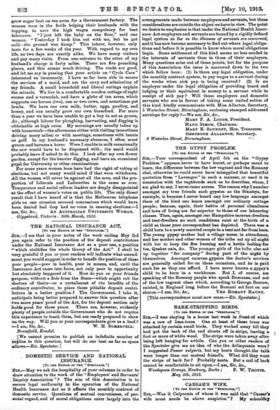[To THE EDITOR OF THE " SPECTATOR. "] SIR,—In your issue
of January 11th, in an article on "The Common Task," you say, " We should have liked some more information about the lives of women in the Colonies." I am the wife of a country clergyman in the south of Victoria in a farming district. Perhaps some information about the liven of my neighbours and myself may be of interest.
The wife of one of the poorer farmers usually rises about 5.30 a.m. or 6 a.m., according to the time of year, and prepares a cup of tea while her husband gets the cows in. They then both go to the milking-yard and milk fifteen or eighteen cows each. Small children are usually taken to the yard also, but one reads sometimes of children who have been left in the house—probably in flannelette nightdresses—being burnt to death while the parents are milking. When the cows are finished, the mother gets the breakfast, while the father prepares either to take the milk to a butter factory or to put it through a separator. After breakfast the mother gets the children ready for school, and then proceeds to wash, cook, sew, and look after the baby. If there is mixed farming, the woman often has charge of the separator (the washing of it alone takes an hour), the man being busy with ploughing or other work. Dinner is eaten about noon—meat, potatoes, and tea are indispensable. Another vegetable ands simple pudding such as stewed fruit are by no means rare. Very few women make their own bread, and when the mother is very busy and can get no domestic help she buys ready-made clothing or gets a sewing girl to come to the house for some days—that is, when she can afford it. The second milking begins at four p.m.
As the family grow older and more prosperous, the children_ can help with the milking, and the mother is usually relieved' from this drudgery. Her cup of early tea is brought to her before she gets up. She has more time for sewing. She begin& a vegetable garden and has more flowers. She drives to visit her friends, and is overworked only when chaff-cutters or threshers (sometimes as many as twenty) come to work on the farm and have to be catered for. Farmers are all reluctant to employ labour, which is expensive and unsatisfactory+. Dairying, the general opinion is, pays splendidly as long as it can be managed without hired labour, but even if labour must be hired it pays no better than sheep, which are easily worked— and it is a much greater tie. Morning and evening, seven days a week, the golden cow awaits her weary worshippers. Milking machines are only used in rare instances, and are not always satisfactory. Almost all farmers' wives can ride,. drive, and make clothing, and many of them own and are able to play a piano. They are good cooks.
To-day I visited three families of Scottish immigrants:. They .hold forty acres of land each on condition that they
grow sugar beet on ten acres for a Government factory. The -women were in the fields helping their husbands with the topping, to save the high wages compulsory for beet labourers. "I just left the baby on the floor," said one woman. " Yesterday I took him out with me, but be got -cold—the ground was damp." This labour, however, only lasts for a few weeks of the year. With regard to my own life, no two days are exactly alike. We have many visitors and pay many visits. From one extreme to the other of my husband's charge is forty miles. There are five preaching places, and this means much driving. The roads are good, And let me say in passing that your article on "Cycle Cars" interested us immensely. I have so far been able to secure the services of a maid, and am the envy and admiration of My friends. A small household and liberal outings explain the miracle. We live in a comfortable wooden cottage of eight s'oonis and a verandah, and have a glebe of ten acres, which supports our horses (two), one or two cows, and sometimes pet lambs. We have our own milk, butter, eggs, poultry, and Loney, and can usually grow our own horsefeed. For more than a year we have been unable to get a boy to act as groom, , although labour for ploughing, harvesting, and digging is .obtainable at high rates. My mornings are usually taken up with housework—the afternoons either with visiting (sometimes -driving many miles) or with meetings, sometimes with tennis or golf. In my husband's necessary absences, I often must groom and harness a horse. Were I unable to milk occasionally the cow would have to be dispensed with ; the maid would probably leave if asked to do this. I look after my own flower garden, except for the heavier digging, and have an occasional pupil for University or other examinations.
For some years women here have had the right of voting at .elections, but not many would mind if that were withdrawn. All the women will never be against all the men, and the pro- portion of Liberals and Labourites is the same as ever. Temperance and social reform leaders are deeply disappointed at the effect of women's votes on public life. The only direct result that I have heard of is that the Melbourne telephone girls on one occasion secured concessions which would have been denied had they had no voice in ensuing elections.—I











































 Previous page
Previous page